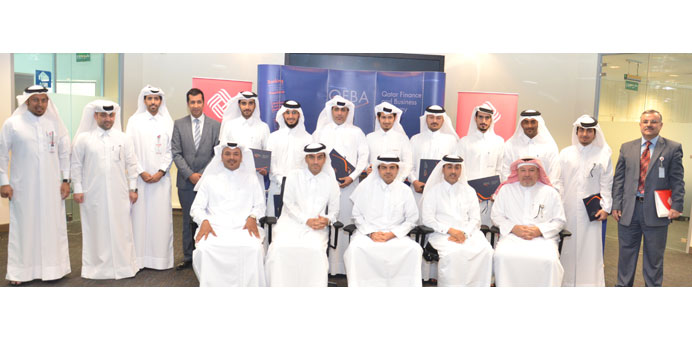Al-Shaibei and al-Horr pose with al-Jamal, al-Musaifry, senior officials of QIIB, QFBA and the new Qatari graduates.
Within its “promising competencies” programme, Qatar International Islamic Bank (QIIB) celebrated the graduation of eight young Qataris, in collaboration with the Qatar Finance and Business Academy (QFBA).
The programme aims to develop leadership competencies in Qataris and entrusting them with important positions within the bank.
Held at the QFBA, the ceremony was attended by Abdulbasit Ahmed al-Shaibei, QIIB chief executive officer, Dr Abdul Aziz al-Horr, QFBA CEO, Jamal Abdullah al-Jamal, QIIB Deputy CEO and Ali Hamad al-Musaifry, QIIB head (Human Resources and Public Services).
Al-Shaibei and al-Horr handed over certificates to the graduates who spent six months acquiring various intensive banking knowledge and skills, both theory and practice, which “enable them to perform the expected tasks, based on internationally approved best banking standards.”
Al-Shaibei congratulated the graduates and lauded their commitment throughout the training period, which lasted six months.
During this programme, they learnt different training subjects including principles and products of Islamic banking, marketing, customer service, English language, professional performance skills, leadership skills, risk management among others.
They acquired practical skills through their work at QIIB branches for one day each week and throughout the training period.
Al-Shaibei said QIIB was satisfied about its key programme to nurture and develop the Qatari talent and employ them in various positions within the bank.
QIIB has made major strides towards its Qatarisation drive, which remains a top priority for the bank. Community service and human development are central to the bank’s strategic vision.
He said the Qatar National Vision 2030 lays emphasis on investing in, and developing human resources.
“As we stand here and celebrate the success of eight young Qatari graduates, who have been equipped to take over important assignments in QIIB, we are participating in realising this great national vision of equipping and empowering Qataris in the banking sector, and help them grow in the profession.”
The CEO expressed QIIB’s deep appreciation to the Qatar Finance and Business Academy led by Dr Abdul Aziz al-Horr for their “great co-operation and efforts in developing and empowering” Qatari human resources, which are of great value to the bank.
Further, the strategic partnership between QIIB and QFBA will “contribute to the well-being of the Qatari society at large.”
Al-Horr praised the QIIB initiative of training and empowering Qatari employees, pointing out that the QFBA’s major role was to develop the competencies of nationals in the financial and banking sector.
TAMU-Q’s four bachelor degree programmes get global recognition
The bachelor’s degree programmes in chemical engineering, electrical engineering, mechanical engineering and petroleum engineering of Texas A&M University at Qatar, (TAMU-Q) have been accredited by the Engineering Accreditation Commission of Abet, the global accreditor of college and university programmes in applied science, computing, engineering and engineering technology.
Abet accreditation assures that programmes meet standards to produce graduates ready to enter critical technical fields that are leading the way in innovation and emerging technologies, and anticipating the welfare and safety needs of the public. Dr Mark H Weichold, dean and CEO TAMU-Q said: “Texas A&M University at Qatar is most pleased with the reaccreditation of its four engineering programmes. It is yet one more affirmation that our students have met the highest standards in engineering education and graduates are prepared to become the next generation of engineering leaders.” Sought worldwide, Abet’s voluntary peer-review process is highly respected because it adds critical value to academic programmes in the technical disciplines, where quality, precision and safety are of the utmost importance. Developed by technical professionals from Abet’s member societies, the Abet criteria focuses on what students experience and learn.

